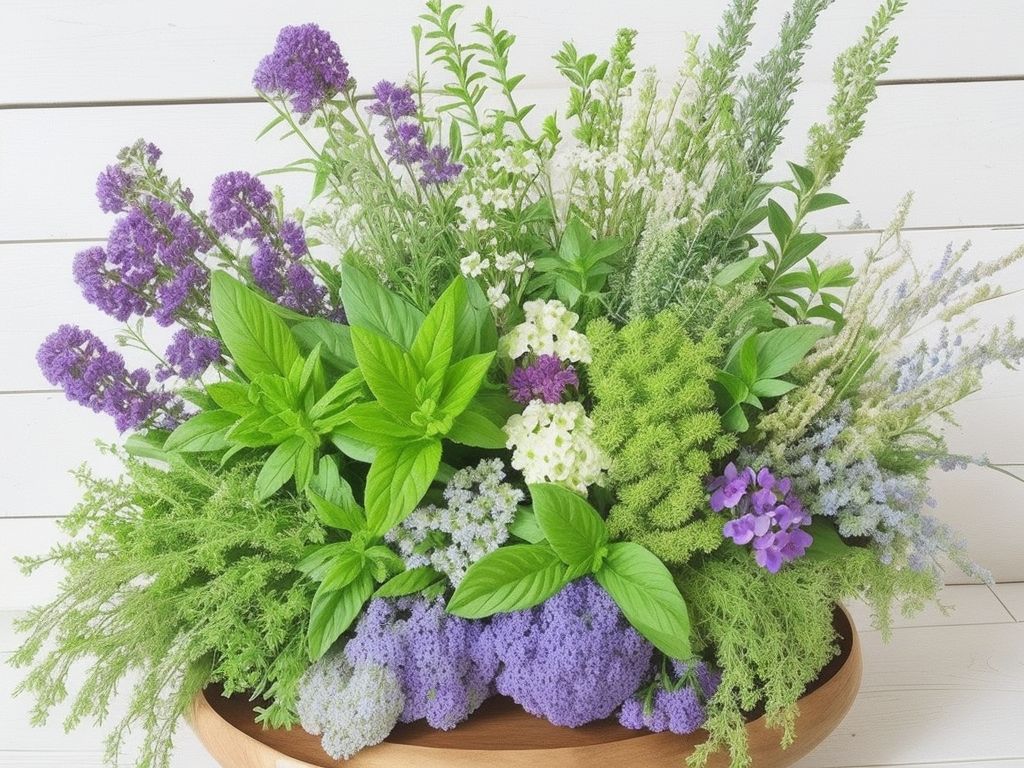Best Herbs for Anxiety while Breastfeeding: A Natural Solution
Anxiety is a common concern among breastfeeding mothers, as the hormonal changes and new responsibilities can sometimes contribute to feelings of stress and unease. It’s important for breastfeeding mothers to find effective and safe ways to manage anxiety to ensure their own well-being and provide a nurturing environment for their baby. One approach that many mothers explore is the use of herbal remedies. Understanding anxiety while breastfeeding and exploring herbal remedies can provide support and relief. Here are some key points to consider:
- Understanding Anxiety while Breastfeeding: Anxiety can manifest in various ways, including excessive worry, restlessness, irritability, and difficulty sleeping. It’s crucial for breastfeeding mothers to recognize and address these symptoms to maintain their mental well-being.
- Herbal Remedies for Anxiety while Breastfeeding: Certain herbs have been traditionally used to alleviate anxiety and promote relaxation. These can offer a natural alternative to conventional medications. Some notable herbs for anxiety include:
- Chamomile: Known for its calming properties, chamomile can help reduce anxiety and promote better sleep.
- Lemon Balm: Lemon balm is often used to ease anxiety symptoms and promote a sense of calmness.
- Lavender: Lavender has a soothing aroma and is commonly used to reduce feelings of stress and anxiety.
- Ashwagandha: Ashwagandha is an adaptogenic herb known for its ability to help the body cope with stress and promote a sense of calm.
- Passionflower: Passionflower is traditionally used to ease symptoms related to anxiety and improve sleep quality.
- Consulting a Healthcare Professional: It’s essential to consult with a healthcare professional before starting any herbal remedies, especially while breastfeeding. They can provide personalized guidance, assess the suitability of specific herbs, and ensure that they won’t interfere with any existing medications or health conditions.
- Safety Considerations for Herbs while Breastfeeding: While herbal remedies can be beneficial, there are important safety considerations for breastfeeding mothers to keep in mind:
- – Choose Trusted Brands: Opt for reputable brands that ensure their herbs are of high quality and free from contaminants.
- – Start with Small Dosages: It’s advisable to start with small doses of herbs and gradually increase if needed, under the guidance of a healthcare professional.
- – Observe for Any Allergic Reactions: Monitor for any allergic reactions or adverse effects when introducing new herbs.
- – Be Aware of Potential Interactions: Some herbs may interact with medications or have contraindications for certain medical conditions, so it’s important to be informed about possible interactions.
- Tips for Managing Anxiety while Breastfeeding: In addition to herbal remedies, incorporating self-care practices can help manage anxiety. These may include practicing mindfulness, getting regular exercise, seeking support from loved ones, and prioritizing rest and relaxation.
By understanding anxiety while breastfeeding, exploring herbal remedies with professional guidance, and adopting self-care practices, mothers can find effective strategies to support their mental well-being while providing the best care for their baby.
Understanding Anxiety while Breastfeeding
Breastfeeding is a beautiful and natural bonding experience between a mother and her baby, but it can also come with challenges, including anxiety. It is crucial for breastfeeding mothers to have a thorough understanding of anxiety and its impact on their general well-being and breastfeeding journey.
Here are some key points to consider when it comes to understanding anxiety while breastfeeding:
1. Hormonal changes: During the postpartum period, hormonal fluctuations are common and can contribute to feelings of anxiety. Recognizing that these changes are a normal part of the process can help alleviate some of the worry.
2. Sleep deprivation: Insufficient sleep can worsen anxiety symptoms. It is vital for breastfeeding mothers to prioritize rest and seek support from their partner, family, or friends to ensure they get enough sleep whenever possible.
3. Breastfeeding difficulties: Challenges in breastfeeding, such as difficulties with latching or low milk supply, can result in stress and anxiety. Seeking guidance from a lactation consultant or a breastfeeding support group is beneficial as they can provide reassurance and practical solutions to overcome these challenges.
4. Self-care: Taking care of your physical and mental health is crucial as a breastfeeding mother. Engaging in activities that promote relaxation and well-being, such as exercise, meditation, or spending quality time with loved ones, can effectively reduce anxiety levels.
5. Seeking professional help: If anxiety becomes overwhelming and starts impacting daily life and the ability to care for oneself and the baby, seeking professional help is important. A healthcare provider can offer guidance and support in effectively managing anxiety.
One example of a breastfeeding mother, Sarah, experienced anxiety during the initial months of breastfeeding. She felt overwhelmed by the demands of caring for a newborn and questioned her ability to produce enough milk for her baby. With the support of her partner and healthcare provider, she sought guidance from a lactation consultant who addressed her concerns and provided practical strategies to increase her milk supply. Sarah also prioritized self-care by incorporating relaxation techniques into her daily routine. Gradually, her anxiety reduced, and she was able to enjoy the breastfeeding journey with her baby.
Remember that understanding anxiety while breastfeeding is crucial for overall well-being. By addressing concerns, seeking support, and prioritizing self-care, breastfeeding can be an empowering and rewarding experience for both you and your baby.
Herbal Remedies for Anxiety while Breastfeeding
Searching for natural remedies to ease anxiety while breastfeeding? Look no further! In this section, we’ll dig into the world of herbal remedies specifically tailored for nursing mothers. From the soothing properties of chamomile and lavender to the calming effects of lemon balm and passionflower, we’ll explore the power of these natural ingredients to alleviate anxiety. Get ready to discover how these herbal champions can bring relief and tranquility to both baby and mama.
Chamomile
is a herb that has been used for centuries for its soothing and calming properties. It has been a popular remedy for anxiety while breastfeeding due to its natural sedative effects.
To understand the benefits of chamomile for managing anxiety while breastfeeding, let’s take a look at the following table:
| Benefits of Chamomile for Anxiety while Breastfeeding |
| 1. Calming effects: Chamomile can help reduce feelings of anxiety and promote relaxation, which can be beneficial for breastfeeding mothers who may experience heightened stress levels. |
| 2. Sleep aid: Chamomile is known to have mild sedative properties, making it helpful for improving sleep quality and combatting insomnia that may be associated with anxiety. |
| 3. Digestive aid: Chamomile has been used traditionally to soothe digestive issues such as indigestion and bloating, which can be beneficial for mothers experiencing gastrointestinal discomfort due to anxiety. |
| 4. Safe for breastfeeding: Chamomile is generally considered safe for breastfeeding mothers when consumed in moderate amounts. It is important to consult with a healthcare professional before incorporating chamomile into your routine. |
Pro-tip: To enjoy the benefits of chamomile, you can brew a cup of chamomile tea and consume it before bedtime to promote relaxation and better sleep. Remember to always choose high-quality chamomile products from trusted brands to ensure safety and effectiveness.
By considering the benefits of chamomile, breastfeeding mothers can explore natural remedies to manage anxiety and promote overall well-being during this special time.
Lemon Balm
Lemon Balm is an herbal remedy that can naturally help alleviate anxiety while breastfeeding. For centuries, it has been recognized for its calming and soothing properties. The compounds present in Lemon Balm interact with specific receptors in the brain, which promote a sense of calmness and reduce feelings of anxiety.
Numerous research studies have demonstrated the potential benefits of Lemon Balm in reducing anxiety symptoms. In a study conducted on breastfeeding mothers, it was found that those who consumed Lemon Balm experienced a significant reduction in anxiety levels compared to a control group. This herbal remedy can be consumed as a tea or in supplement form, and it is generally considered safe to use while breastfeeding.
It is important to note that while Lemon Balm can provide relief from anxiety, it is not a substitute for professional medical advice. If you are experiencing severe anxiety symptoms, it is recommended to consult a healthcare professional for proper evaluation and treatment options.
When using Lemon Balm or any herbal remedy while breastfeeding, it is crucial to choose trusted brands that ensure quality and safety. Starting with small dosages and gradually increasing if needed is also advisable. Additionally, it is important to observe for any potential allergic reactions and be aware of possible interactions with other medications or supplements.
Lemon Balm is a natural remedy that may help manage anxiety while breastfeeding. It is essential to consult a healthcare professional and use trusted brands when incorporating herbal remedies into your breastfeeding routine. By doing so, you can benefit from the calming effect and promote a sense of well-being during this important period.
Lavender
- Lavender has been used for centuries for its calming and soothing properties.
- It is commonly used in aromatherapy to promote relaxation and reduce anxiety.
- Research suggests that lavender can help reduce anxiety levels and improve sleep quality.
- It can be consumed as a tea or used topically in the form of essential oils.
- When using lavender essential oil, it is important to dilute it properly before applying it to the skin.
- Lavender tea can be brewed by steeping dried lavender flowers in hot water for about 10 minutes.
- Adding lavender oil to a diffuser or bath can also help create a calming atmosphere.
- It is important to note that while lavender is generally considered safe, it may cause skin irritation or allergic reactions in some individuals.
- It is always recommended to consult with a healthcare professional before using lavender or any other herbal remedy while breastfeeding.
- Lavender can be a natural and effective option for managing anxiety while breastfeeding, but it is important to use it safely and in moderation.
Ashwagandha
- Ashwagandha is an herb commonly used for its potential benefits in reducing anxiety while breastfeeding.
- Ashwagandha, also known as Withania somnifera, is an adaptogen that may help improve stress resilience and support mental well-being.
- Studies have suggested that ashwagandha may reduce cortisol levels, a hormone associated with stress, thereby promoting relaxation and calmness.
- Ashwagandha supplements are available in various forms, including capsules, powders, and liquid extracts.
- When considering the use of ashwagandha while breastfeeding, it is important to consult with a healthcare professional to determine the appropriate dosage and ensure it is safe for both the mother and baby.
Ashwagandha has been used for centuries in traditional Ayurvedic medicine for its potential medicinal properties. It is native to India and is also cultivated in other parts of the world. The herb is believed to possess adaptogenic abilities, meaning it helps the body adapt to stress and promotes overall well-being. In recent years, ashwagandha has gained popularity for its potential benefits in reducing anxiety and enhancing mental well-being. More research is needed to fully understand its effects and optimal dosage for specific conditions. As with any herbal remedy, it is essential to consult with a healthcare professional before incorporating ashwagandha into a breastfeeding routine to ensure its safety and effectiveness.
Passionflower
Passionflower is a natural herb that has been used for centuries as a herbal remedy for managing anxiety while breastfeeding. Its calming and soothing properties make it a beneficial option for relieving anxiety symptoms without any harmful side effects.
To ensure that you are using a high-quality and effective form of passionflower, it is important to choose trusted brands. Start by incorporating small dosages into your routine and gradually increase if needed, allowing your body to adjust and determine the right amount for you.
While using passionflower, it is essential to watch out for any allergic reactions, although they are rare. If you experience any allergic symptoms, discontinue use immediately and consult a healthcare professional. Additionally, it is crucial to be aware of potential interactions with other medications or supplements you may be taking. It is always recommended to consult with a healthcare professional before starting any new herbal remedies or supplements, especially while breastfeeding.
Incorporating passionflower into your anxiety management strategy while breastfeeding can be an effective and natural way to find relief. Consider trying passionflower along with other herbal remedies to enhance your well-being during this special time.
Consulting a Healthcare Professional
When it comes to herbs for anxiety while breastfeeding, it is crucial to consult a healthcare professional. Seeking guidance from a healthcare professional is essential for several reasons.
A healthcare professional can assess your specific situation and provide personalized advice. They will take into consideration factors such as your medical history, any medications you are currently taking, and the potential effects on both you and your baby. With their expertise, they can offer guidance on the safety and effectiveness of various herbs for anxiety while breastfeeding.
Consulting a healthcare professional can help you navigate through the vast amount of information available regarding herbs and their potential benefits or risks. They can provide evidence-based recommendations and inform you about any potential interactions or side effects that could occur.
By consulting a healthcare professional, you allow for ongoing monitoring and support. They can evaluate the effectiveness of the chosen herbs and make adjustments if necessary. Regular check-ins can ensure that any potential adverse effects are promptly addressed, prioritizing the well-being of both you and your baby.
When considering herbs for anxiety while breastfeeding, it is vital to consult a healthcare professional. They provide personalized guidance, evidence-based recommendations, and ongoing support to ensure the safety and well-being of both you and your baby.
Remember, the information provided here is not a substitute for professional medical advice. Always consult a healthcare professional before starting or discontinuing any treatment or medication.
Safety Considerations for Herbs while Breastfeeding
When it comes to ensuring safety while using herbs while breastfeeding, there are several key considerations to keep in mind. From choosing trusted brands to starting with small dosages, being aware of potential interactions, and observing for any allergic reactions, this section arms you with the essential knowledge to navigate the use of herbs during this important stage of motherhood. So, let’s dive in and explore how to make informed decisions and prioritize both your well-being and your baby’s health.
Choose Trusted Brands
- When looking for herbal remedies to manage anxiety while breastfeeding, it is crucial to choose trusted brands. Research the reputation of the brand by reading positive reviews from other breastfeeding mothers. This way, you can ensure that the products you purchase have been tested for safety and quality.
- Certifications are also important indicators of a trusted brand. Look for brands that have certifications from reputable organizations such as USDA Organic or NSF International. These certifications guarantee that the product meets specific standards and has undergone thorough testing.
- Take the time to read the ingredient list of the herbal remedies. Trusted brands use high-quality, organic ingredients and avoid adding any additives or preservatives that could be harmful. Reading the ingredient list helps you make an informed decision.
- Consider the source of the herbs used in the remedies. Trusted brands source their herbs from reputable suppliers, ensuring that they are organic and sustainably sourced. This guarantees the overall quality of the product.
- Before starting any herbal remedies while breastfeeding, consult with healthcare professionals. They can provide guidance on choosing trusted brands that are safe and suitable for your specific needs. The input of healthcare professionals is invaluable in ensuring your well-being.
Choosing trusted brands is crucial to guarantee the safety and quality of the herbal remedies you consume while breastfeeding. These brands have built a positive reputation, undergo rigorous testing, and use high-quality ingredients. By researching, checking certifications, reading ingredient lists, considering herb sourcing, and consulting healthcare professionals, you can confidently choose trusted brands to manage your anxiety while breastfeeding. Always prioritize the well-being of both yourself and your baby.
In recent years, the interest in herbal remedies for anxiety management while breastfeeding has grown. Many mothers have experienced relief from anxiety symptoms through the use of these natural remedies. Ensuring that you choose trusted brands is essential, as they prioritize safety and quality. Trusted brands offer herbs of the highest standard, posing no risk to both the breastfeeding mother and baby. By selecting trusted brands, mothers gain peace of mind, knowing they are making the best choices for their overall well-being.
Start with Small Dosages
When using herbal remedies for anxiety while breastfeeding, it is important to start with small dosages to ensure safety and effectiveness. Here are some reasons why starting with small dosages is recommended:
1. Individual Sensitivity: Every person reacts differently to herbal remedies. By starting with small dosages, you can assess how your body responds to the herb and adjust the dosage accordingly.
2. Minimize Side Effects: Some herbs may cause side effects, especially if taken in large doses. Starting with small dosages helps reduce the risk of experiencing adverse effects and allows for gradual dosage adjustment if necessary.
3. Tolerance Levels: Starting with small dosages helps gauge your tolerance level for the herb. If you find that a small dosage effectively manages your anxiety, there may be no need to increase the dosage.
4. Personalization: Each person’s anxiety symptoms and severity may vary. By starting with small dosages, you can personalize the amount of herb you need based on your specific needs and response.
Suggestions:
– Begin with the lowest recommended dosage of the chosen herb for anxiety relief while breastfeeding.
– Monitor your response and any changes in symptoms.
– Consult a healthcare professional if you have any concerns or questions about the appropriate dosage for your situation.
– Gradually increase the dosage if necessary, following the guidance of a healthcare professional.
– Keep track of any changes or improvements in your anxiety symptoms as you adjust the dosage.
Remember to prioritize the safety of both you and your baby while using herbal remedies for anxiety while breastfeeding.
Observe for Any Allergic Reactions
When using herbal remedies for anxiety while breastfeeding, it is crucial to carefully observe for any allergic reactions. Here are steps you can take to ensure your safety:
1. Research and Identify Potential Allergens: Prior to starting any herbal remedy, it is important to familiarize yourself with the ingredients and identify any potential allergens. Some common allergens to be aware of include chamomile, lemon balm, lavender, ashwagandha, and passionflower.
2. Start with a Small Dosage: Begin with a low dosage of the herbal remedy in order to assess your body’s reaction. This will enable you to determine if you have any allergic responses.
3. Observe for Any Signs of Allergic Reactions: After taking the herbal remedy, closely monitor your body for any indications of allergic reactions. These may manifest as hives, itching, swelling, difficulty breathing, or digestive discomfort.
4. Discontinue Use if Allergic Reactions Occur: In the event that you experience any allergic reactions, it is crucial to immediately stop using the herbal remedy and seek medical attention if necessary. Prioritizing your health and well-being is essential.
5. Consult a Healthcare Professional: If you have any concerns or questions regarding herbal remedies or potential allergic reactions, it is advisable to consult with a healthcare professional. They can offer guidance and ensure that you make informed decisions about your well-being.
When it comes to observing for any allergic reactions, taking cautious steps and seeking professional advice will help you make the best choices for managing anxiety while breastfeeding. Always remember to prioritize your safety as well as the safety of your baby.
Be Aware of Potential Interactions
When using herbal remedies for anxiety while breastfeeding, it is crucial to be aware of potential interactions with other medications or substances. Here are some key considerations to keep in mind:
- Conduct thorough research on potential interactions: Before using any herbal remedy, it is important to do comprehensive research to determine if there are any known interactions with medications you may be taking or substances you may be consuming.
- Always consult with a healthcare professional: It is highly recommended to consult with a healthcare professional, such as a doctor or lactation consultant, before starting any herbal remedy. They can provide guidance on potential interactions and ensure that it is safe for both you and your baby.
- Inform your healthcare provider: When discussing your anxiety and considering herbal remedies, make sure to inform your healthcare provider about all medications, supplements, and herbal remedies you are currently using. This will help them identify any potential interactions.
- Monitor for side effects: While using any herbal remedy, pay close attention to how your body reacts. If you experience any unusual symptoms or side effects, stop using the remedy and consult with your healthcare provider.
- Choose reputable brands: When purchasing herbal remedies, opt for products from trusted brands that adhere to high quality and safety standards. This can help minimize the risk of potential interactions.
Remember to always prioritize your and your baby’s health when considering herbal remedies for anxiety while breastfeeding. Being aware of potential interactions can help ensure a safe and effective treatment.
Tips for Managing Anxiety while Breastfeeding
If you’re looking for tips on managing anxiety while breastfeeding, there are several effective strategies you can try to create a more calm and stable experience. Here are some natural ways to incorporate them:
- Practice deep breathing techniques: When you feel anxious, try deep breathing exercises. Inhale and exhale slowly, focusing on your breath to relax your body and mind.
- Engage in regular exercise: Incorporating light exercises like walking or yoga into your daily routine can release endorphins, which are natural mood boosters. This can help alleviate anxiety.
- Seek social support: Reach out to friends, family, or support groups who can offer empathetic understanding and encouragement. Sharing your feelings and experiences can lighten the burden of anxiety.
- Establish a self-care routine: Prioritize activities that promote relaxation and well-being, such as taking a warm bath, reading a book, or practicing mindfulness techniques.
- Maintain a balanced diet: Including foods rich in omega-3 fatty acids, like salmon and walnuts, in your diet can have a positive impact on your mental health and help reduce anxiety symptoms.
Remember, managing anxiety while breastfeeding is a journey, and it may take time to discover the strategies that work best for you. Be patient and kind to yourself as you navigate this experience.
Frequently Asked Questions
FAQs on Herbs for Anxiety while Breastfeeding:
1. Can I use herbal medicines to support postpartum recovery?
Yes, herbal medicines can be a safe and effective way to support postpartum recovery, including managing anxiety. However, it is always recommended to consult with a healthcare professional before starting any new herbal remedies.
2. What are some breastfeeding-friendly herbs for anxiety?
Three breastfeeding-friendly herbs recommended for anxiety while breastfeeding are Passion Flower, Skullcap, and Ashwagandha. These herbs can help regulate postpartum anxiety and promote a sense of calmness.
3. Are Passion Flower, Skullcap, and Ashwagandha safe to use while breastfeeding?
Yes, Passion Flower, Skullcap, and Ashwagandha are considered safe to use while breastfeeding. However, it is important to use them in moderation and follow recommended dosages. It is advisable to consult with a healthcare professional before incorporating these herbs into your postpartum recovery regimen.
4. How can Skullcap help with postpartum insomnia?
Skullcap is known for its calming properties and can help decrease stress and anxiety, particularly for postpartum insomnia caused by worry and nervous irritability. It falls under the nervine category of herbs, which are beneficial for promoting relaxation and supporting healthy sleep patterns.
5. What is an adaptogenic herb, and how can it help with postpartum anxiety?
Ashwagandha is an adaptogenic herb that supports the body in adapting to stress. It helps regulate the functioning of the hypothalamic-pituitary-adrenal axis, which plays a role in stress response. Ashwagandha can be beneficial for regulating postpartum anxiety and depression.
6. Is professional guidance necessary when using herbal remedies while breastfeeding?
Yes, it is strongly recommended to seek professional guidance, preferably from a naturopathic physician or healthcare professional specialized in postpartum care. They can provide personalized advice, ensure compatibility with breastfeeding, and recommend appropriate dosages for optimal results.









